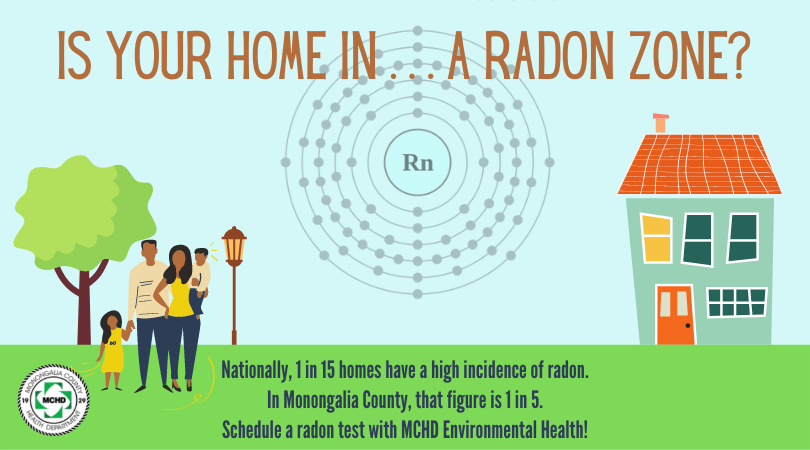Do you live in a Radon Zone? It's easy to find out and address

Jan. 5, 2022
By Mary Wade Burnside
Happy New Year! Do you have any resolutions to keep? Here’s an easy one. Get your home tested for radon.
January is National Radon Action Month, as designated by the Environmental Protection Agency (EPA). It’s an important observance here in Monongalia County because while 1 in 15 homes nationally have what is considered to be a high rate of radon, it’s 1 in 5 homes in Monongalia County.
It’s also a great time to get a radon test, for two reasons. It’s better to conduct the test during colder months when homes are closed up for a more accurate reading. And also, Monongalia County Health Department’s Environmental Health program will soon triple the number of sanitarians who are certified to do the testing, from one to three.
Here’s how it works: A continuous radon monitor will be set up in your home and left for 72 hours. The sanitarian will return to collect the monitor and run the report, which will be sent to the homeowners.
If the reading is 4 picocuries per liter or higher, then the homeowner should provide mitigation techniques that will lower the radon levels in their home. A certified radon contractor can do the job and the average cost is $1,500.
Anyone who is considering building a new home or business should factor radon mitigation into their blueprints for a passive mitigation system. Some methods help keep radon from entering your home; others focus on creating better air flow for the radon that does seep in.
Breathing in high quantities of radon over a period of years is dangerous to the health of your lungs. Radon is the second-leading cause of lung cancer in the United States, after smoking cigarettes. So if you smoke AND have a high rate of radon in your home, that definitely will increase your risk for the disease.
So what is radon? It’s a naturally occurring colorless and odorless gas that results from the decay of uranium deep underground. Radon moves up through the bedrock, then into the soil, then up from the soil into the atmosphere.
When radon comes up into the air outside, it is perfectly harmless. When radon comes up into your basement and into your house, it can become a problem.
If you look at the West Virginia radon map on MCHD Environmental Health’s website, you will see that the “red zone” goes from the Northern Panhandle, across the border with Pennsylvania and Maryland into the Eastern Panhandle, and then south through the counties that border Virginia. This is due to the rockiness of these areas.
In 2015, the EPA released the National Radon Action Plan, which set a lofty goal to mitigate 5 million high-radon homes, with an estimate of saving 3,200 lives annually, by 2020. Moving forward, the EPA’s goal with the NRAP is to work to incorporate radon requirements into housing financing and codes to achieve an even greater impact by 2025.
A radon test is a simple way to help keep you and your family safe and healthy. To set up a test, call MCHD Environmental Health at 304-598-5131 or use the contact form at monchd.org/radon.html to make an appointment.
Another way to learn more about radon is by viewing this video that Monongalia County Health Department created here in Morgantown.
And because it’s the new year, let’s give some space to the No. 1 cause of lung cancer. It’s always a great time to quit smoking. It’s been a few years since the state updated its West Virginia Tobacco Quitline, which offers online enrollment, coaching calls and products to help you give up cigarettes.
Mary Wade Burnside is the public information officer at Monongalia County Health Department.